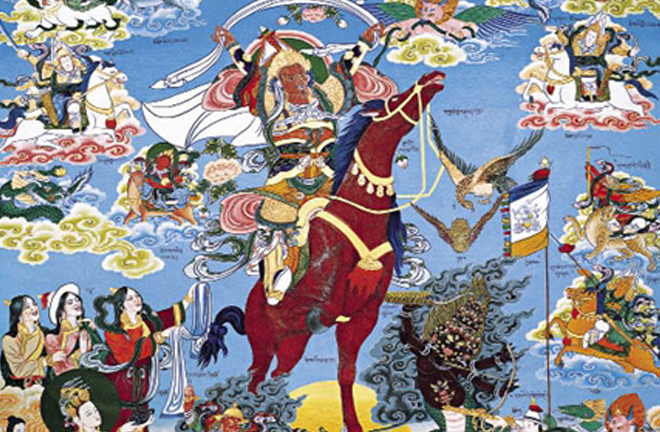Scholars review 70 years of China’s folklore studies

A thangka painting of King Gesar Photo: CHINA.ORG.CN
Since the founding of the People’s Republic of China in 1949, especially since the reform and opening up, China has experienced extensive and profound social changes. China’s folklore studies has always been based on basic national conditions and historical traditions.
At a symposium in mid-June, scholars reviewed the perspectives and features of folklore studies in China over the past seven decades.
The symposium, co-hosted by Minzu University of China and China Folklore Society in Beijing, also shed light on the direction of the country’s folklore studies.
Lin Jifu, a professor from the School of Ethnology and Sociology at Minzu University of China, said that over the past 70 years, Chinese folklore has focused on holistic research and realistic interpretation, making achievements in the construction of folklore theory, folk literature and oral traditions, historical folklore, and urban folklore.
Xiao Fang, a professor at Beijing Normal University, reviewed folklore research on rural social governance in the past seven decades, saying that the field’s research horizons are constantly expanding. It involves folk literature, folk beliefs, civil organizations, protection of intangible cultural heritage and protection of ancient villages. By constantly learning from the research methods of anthropology, sociology and other disciplines, it has gradually explored a multi-disciplinary research approach.
However, Xiao said that folklore studies of rural social governance is still limited: There are few macroscopic studies, the theoretical discussion is insufficient, and the research approach to rural social governance is not clear enough. All these areas need further exploration.
The construction of Chinese epic studies is a long-term systematic project that faces many challenges. When talking about the disciplinary development plan for Chinese epic studies, Bamo Qubumo, a research fellow from the Institute of Ethnic Literature at the Chinese Academy of Social Sciences (CASS), said that the key research projects to be implemented include field research and follow-up investigations of inheritors, long-term research on specific epic traditions, the tracing of the theoretical methodology of folklore and oral poetics, measures to protect intangible cultural heritage and the sustainability of epic traditions, and the collection, collation and translation of key epic texts.
In light of the Belt and Road initiative, Bamo suggested strengthening the investigation and study of the Epic of King Gesar, the Epic of Manas and the Jangar Epic, the three major epics in China.
Over the past 70 years, Chinese folklore has remained people-oriented. Ma Guoqing, director of the School of Ethnology and Sociology at Minzu University of China, said that the Chinese folklore discipline was developed on the basis of folk literature and under the framework of sociology, anthropology and ethnology. After the efforts of several generations of folklorists, Chinese folklore has formed its own disciplinary characteristics.
Honorary CASS Member Liu Kuili reviewed the international exchange of Chinese folklore. He said that, going from being unknown in the world to having its own voice, and then going from there to join the international symphony, Chinese folklore has gradually entered the international academic arena.
Fang Lili, president of the China Society of Anthropology of the Arts, said that the world is witnessing both globalization and anti-globalization, both smart technology and the revival of handicrafts, both high technologies and humanistic reflection, both protection of refined traditional culture and social development. Human society is undergoing major transformations. Against this backdrop, the focus of each discipline is different, but the problems they face are the same. As such, folklore studies needs to learn from other disciplines in terms of disciplinary construction and discourse systems.
In future research, Lin said that Chinese folklore should remain people-oriented, caring for the people and researching the people. The discipline needs to expand its research scope, seek theoretical innovation, and form multi-disciplinary and multi-field cooperation and interaction. At the same time, it needs to focus on emerging social problems and actively respond to people’s lives and the cultural phenomena emerging during social transformation.
edited by JIANG HONG
